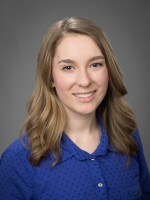Rikki Ricker and Tray Abney are longtime friends and transplants to Reno. Rikki has worked for various nonprofits, and Tray is a partner for a political consulting firm that offers a range of services, including lobbying.
They were both participants in One Small Step, a conversation program designed to bring two people with different political ideologies together. Every conversation starts with participants reading each other’s bios.
Based on their bios, Rikki, a Democrat, has been shaped by the views of her parents, who she lovingly refers to as “hippies.” On the other hand, Tray, a Republican, grew up with more conservative influences.
Tray Abney: I was born in southern Louisiana, in Lake Charles, Louisiana, but moved up to Springfield, Missouri, when I was eight. [It’s] very conservative, both, you know, politically and very socially conservative.
So, Rikki, I guess I’ll ask you... I think I liked your bio better because it actually went into your parents. What made them hippies? Were they hippies in the traditional sense? Like, you know, dress the part, the whole Woodstock thing? Or more just in their value system, or their culture, or how they raised you?
Rikki Ricker: I would say, to answer your question, all of the above. Southern Ohio is not necessarily known for its liberal ways. Nothing wrong with it; again, a great place to grow up. I grew up small town, third generation in a village, you know, very idealistic. But I think that they were just young enough to be inspired by that revolution talk of the late ‘60s and early ‘70s. And so that’s how my sister and I grew up, which was, “Take care of one another, take care of the planet, look out for your neighbor,” which is, quite frankly, that’s not a hippie or a liberal mindset at all.
Tray: Do you think your beliefs or thoughts have diverged? Like, from what your parents, or your dad... like, from what you grew up with? I mean, do you have a different outlook on fiscal policy, or fiscal conservatism, or liberalism, or taxes, or spending, or any of that stuff? Like, do you think it’s changed as you’ve grown older?
Rikki: I absolutely think it’s changed. My dad and I got into this conversation about veterans. And of course, you know, he was, “Give them everything they need, give it through the roof,” and all this stuff. Not that I’m to say that that is against anything. It was more like, “Dad, in my opinion, in dealing with some of these services, it’s a broken system.” And we need to just stop throwing money at it, and we need to start looking at where we can maybe fix the hole in the spending over here because it’s leaving an empty pot over on the other side of the room.
No one’s looking at the systems; they’re just looking at the problems and saying, “We need to throw money at it.” And so yes, I think that I would find myself in an argument with someone much more progressive than I.
Tray: No, I think I’m in the same boat. You know, when I talk to my Republican friends, and Republicans are supposed to be, you know, “anti-tax,” right, or “anti-tax increase.” But I was active when I was at the Chamber of Commerce, pushing the WC-1 campaign a few years back, which raised sales tax to build new schools. And it was a math problem, right? We have X amount of students coming into the system, we needed X more schools to hold them, including my son, and we didn’t have the money to do it. And so, what is the solution?
But is there anything that you want me to understand about you that we haven’t talked about?
Rikki: Maybe kind of, one of the many themes — I think we’ve got a couple going — is that, as we age, and we get more experiences underneath our belt, and we have to deal with the various chapters of our life, I think that our politics and our priorities change. And so it evolves into, “This is where I started out at 22, walking around a college campus with my liberal tank top on, you know, so proud to and still would be proud to participate in ACLU events.” That doesn’t necessarily still categorize me today. It is absolutely still a part of me, but I think how you said, you know, you evolved, and I think we all do. It’s nice to think that we can change and evolve and become something more.
Tray: Well, you certainly don’t want to see me walking around in a tank top, so...
[Rikki laughs]
This conversation was facilitated by Natalie Van Hoozer and co-produced by Carly Sauvageau and Natalie. KUNR and Noticiero Móvil’s work with StoryCorps on One Small Step is made possible in part by the Corporation for Public Broadcasting, a private corporation funded by the American people. Nevada Humanities was a key community partner for this program.








